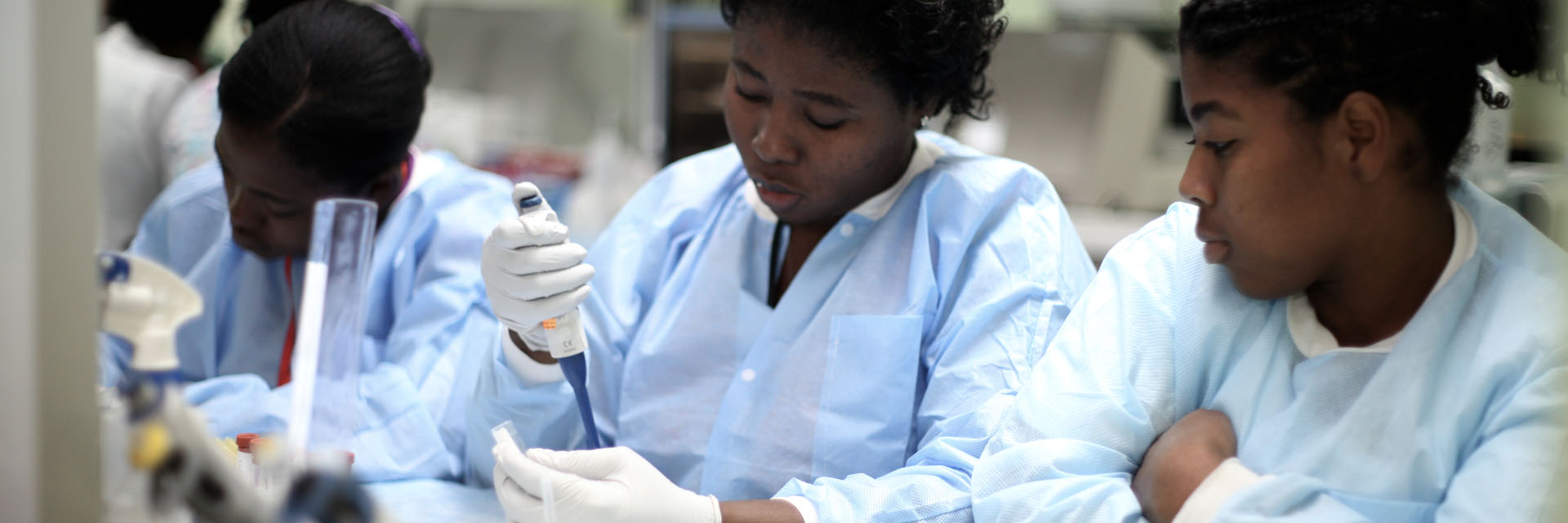Haiti is one of the first countries in which we operated. We work alongside a long-standing partner, the GHESKIO Centers, where the Rodolphe Mérieux Laboratory is located. It is the only functioning high biosafety level (BSL3) laboratory in the country. We supported the implementation of microbiology and molecular diagnostic techniques to enable HIV viral load quantification, cholera testing and Zika virus diagnostics.
Access to diagnosis
Starting in 2015, we coordinated the SPHaïtiLAB project to strengthen the country’s laboratory system, and co-funded with the European Union as part of their “Supporting Public Health Institutes Programme”. The objective of the project was to contribute to the improvement of the health of the Haitian population through analysis and strategic advice on laboratory and research policy.
At the same time, to meet this reinforcement objective, SpHaïtiLAB has allowed to train and reinforce the skills of the staff of many laboratories, both on global subjects and on advanced technical aspects.
SPHaïtiLab was the result of a collaboration between the National Public Health Laboratory (LNSP), the Department of Laboratory and Research Epidemiology (DELR), the GHESKIO Centers and the African Institute of Public Health in Burkina Faso.
We also contributed our expertise to the reconstruction of the biology laboratory at the State University hospital in Haiti, which was destroyed by the earthquake in 2010.
Enhancing research capabilities
As part of the GABRIEL network, Haitian researchers at the Rodolphe Mérieux Laboratory benefit from training modules and participate in collaborative research programs. The GHESKIO Centres’ laboratories (IMIS and INRL) have obtained international quality accreditation, in accordance with the ISO 15189 standard.
Knowledge-sharing
To encourage continuing training for practicing laboratory technicians in Haiti, we created the BAMS course (Bachelor in Applied Medical Biology). This degree level course began in 2007 in Mali and in 2011 in Haiti and aims to strengthen theoretical and practical skills of laboratory technicians, focusing on best practices and logistical aspects. 126 Haitian laboratory technicians obtained their diploma since the creation of the course, initiated in partnership with the School of Biology, Biochemistry and Biotechnology (ESTBB) of the Catholic University of Lyon, the Mérieux Foundation and the National Public Health Laboratory. The last class graduated in 2018; the program is now integrated into the initial training program for the Bachelor’s degree in Medical Biology at the Faculty of Medicine and Pharmacy of the State University of Haiti (UEH/FMP).
Support for mothers and children
In partnership with Fondation Christophe et Rodolphe Mérieux, we support several NGOs that fight poverty in Haiti and the devastating effects of natural disasters.
We put in place a micro-credit program for women living with HIV/AIDS, in collaboration with ACME (Association for Cooperation with Micro-Enterprises) and the GHESKIO Centers. It offers women living with HIV/AIDS training sessions on managing an income-generating activity. These women also have the opportunity to receive a micro-credit to support their business.
We support the children’s home in Leogane, village de Nazareth. We support the development of the institution and improve the living conditions of children and staff through the construction of houses, providing access to clean water and better nutrition, but also provision of school supplies, access to healthcare and development of income-generating activities.
We also support the Klib Timoun Kè Kontan (AKTKK) association: This training center aims to help disadvantaged children by giving them the opportunity to learn an occupation (such as baking, embroidery, floral art, crafts). A newly rehabilitated boarding school enables children from remote and isolated regions to be accommodated on site.

